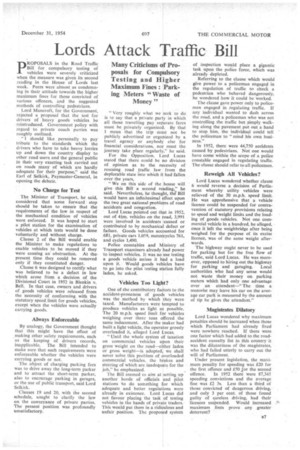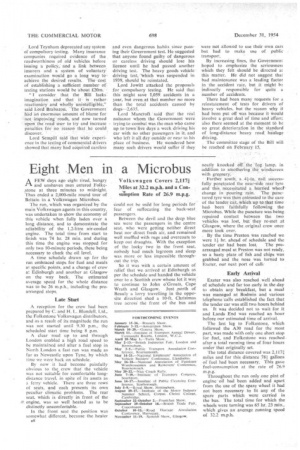Lords Attack Traffic Bill
Page 33

Page 34

If you've noticed an error in this article please click here to report it so we can fix it.
Many Criticisms of Proposals for Compulsory Testing and Higher Maximum Fines : Parking Meters "Waste of Money"
pROPOSALS in the Road Traffic Bill for compulsory testing of vehicles were severely criticized when the measure was given its second reading in the House of Lords last week. Peers were almost, as condemning in their attitude towards the higher maximum fines for those convicted of various offences, and the suggested methods of controlling pedestrians.
Lord Mancroft, for the Government, rejected a proposal that the test for drivers of heavy goods vehicles be reintroduced. Government policy with regard to private coach parties was roughly outlined.
"1 should like personally to pay tribute to the standards which the drivers who have to take heavy lorries up and down the country display to other road users and the general public in their very exacting task carried out on roads many of which are hardly adequate for their purpose," said the Earl of Selkirk, Paymaster-General, in opening the debate.
No Charge for Test
The Minister of Transport, he said, considered that some forward step should be taken to ensure that the requirements of the law in respect of the mechanical condition of vehicles were enforced. It was hoped to start a pilot station for the examination of vehicles at which tests would be done voluntarily and without charge.
Clause 2 of the Bill would enable the Minister to make regulations to enable vehicles to be moved if they were causing an obstruction. At the. present time they could be removed only if they constituted danger.
Clause 6 was designed to rectify what was believed to be a defect in law which arose from a decision of the Divisional Court in 1952 in Blenkin v, Bell. In that case, owners and drivers of goods vehicles were released from the necessity of conforming with the statutory speed limit for goods vehicles, except when the vehicles were actually carrying goods,
Always Enforceable
By analogy, the Government thought that this might have the effect of making other safety requirements, such as the keeping of drivers records, inapplicable. The Bill intended to make sure that such requirements were enforceable whether the vehicles were carrying goods or not.
The object of charging parking fees was to drive away the long-term parker and to attract the short-term parker, also to encourage parking in garages, or the use of public transport, said Lord Selkirk.
Clauses 19 and 20, with the second schedule, sought to clarify the law on the conveyance of private parties. The present position was profoundly unsatisfactory. "Very roughly what we seek to do is to say that a private party in which all those travelling pay separate fares must be privately organized. By that I mean that the trip must not be publicly advertised or organized by a travel agency or anybody else for financial considerations, nor must the journey take place regularly," he said.
For the Opposition, Lord Lucas stated that there could be no division of opinion as to the necessity of rescuing road traffic law from the deplorable state into which it had fallen over the years.
"We on this side of the house will give this Bill a second reading," he said. Nevertheless, he thought, the Bill would have an infinitesimal effect upon the two great national problems of road accidents and congestion.
Lord Lucas pointed out that in 1952, out of 4-im. vehicles on the road, 3,991 were involved in accidents caused or contributed to by mechanical defect or failure. Goods vehicles accounted for 681, private cars 1,059, motorcycles 761, and cycles 1,490, Police constables and Ministry of Transport examiners already had power to inspect vehicles. It was no use testing a goods vehicle unless it had a load upon it. Would goods vehicles have to go into the pilot testing station fully laden, he asked.
Vehicles Too Light?
One of the contributory factors to the accident-proneness of goods vehicles was the method by which they were taxed. Manufacturers were tempted to produce vehicles as light as possible. The 20 m.p.h. speed limit for vehicles weighing over three tons offered the same inducement. After the maker had built a light vehicle, the operator grossly overloaded it, alleged Lord Lucas.
" Until the whole system of taxation on commercial vehicles upon their gross weight on the road—either laden or gross weight—is adopted, we shall never solve this problem of overloaded commercial vehicles, the brakes and steering of which are inadequate for the job," he emphasized.
The Bill seemed to aim at setting up another horde of officials and pilot stations to do something for which adequate and better regulations were already in existence. Lord Lucas did not favour placing the task of testing vehicles in the hands of private traders. This would put them in a ridiculous and unfair position. The proposed system of inspection would place a gigantic task upon the police force, which was already depleted.
Referring to the clause which would give power to a policeman engaged in the regulation of traffic to check a pedestrian who behaved dangerously, he wondered how it could be Worked, The clause gave power only to policemen engaged in regulating traffic. If any individual wanted to dash across the road, and a policeman who was not controlling the traffic but simply walking along the pavement put out a hand to stop him, the individual could tell the policeman to "mind his own business."
In 1952, there were 44,750 accidents caused by pedestrians. Not one would have come within the scope of a police constable engaged in regulating traffic. The clause should refer to all policemen.
Reweigh All Vehicles?
Lord Lucas wondered whether clause 6 would reverse a decision of Parliament whereby utility vehicles were relieved of the 30 m.p.h. speed limit. He was apprehensive that a vehicle licence could be suspended for contravention of statutory provisions relating to speed and weight limits and the loading of goods vehicles. Not one commercial vehicle in a hundred, he alleged, once it left the weighbridge after being weighed. for the purpose of its excise licence, was of the same weight afterwards.
The highway ought never to be used for parking but for the free flow of traffic, said Lord Lucas. He was moreover, opposed to hiring out the highway for parking and garaging. Local authorities who had any sense would not waste their money on parking meters which had only one advantage over an attendant—" The time a motorist may leave his car on the average car park is measured by the amount of tip he gives the attendant."
Magistrates Dilatory
Lord Lucas wondered why maximum penalties should be increased when those which Parliament had already fixed were nowhere reached. if there were one factor which had added to the roadaccident casualty list in this country it was the dilatoriness of the magistrates, who had failed utterly to carry out the will of Parliament.
Under present legislation, the maximum penalty for speeding was £20 for the first offence and £50 .for the second offence. In 1952 there were 87,345 speeding convictions and the average fine was £2 3s. Less than a third of those convicted of dangerous driving, and only 3 per cent. of those found guilty of careless driving, had their licences susPended. Would increased maximum fines prove any greater deterrent?
• Lord Teynham deprecated any system of compulsory testing. Many insurance companies required evidence of the roadworthiness of old vehicles before issuing a "policy; and a link between, insurers and a system of voluntary' examination would go a long way. to achieve the desired results. The cost of establishing a sufficient .numberof testing stations Would be 'AMU £20m. '
"1 consider. that the Bill lacks: imagination. and that itis ratherreactionary and wholly 'unintelligible," said Lord Brabazpir, -The Government had an enormous amount of blame for .,:flot-initirOvirii. roads, and now turned tipoii-ahe road'User to try and increase Penaltiesfor: no reason that he could
discover. ' • Lord Sempill Said that Wide experience in the testing of commercial drivers showed that many 'had aequired careless
and even dangerous habits since passing their Government test. He suggested that anyone found guilty of dangerous or careless driving should lose his licence until he had passed another driving test. The heavy goods vehicle driving test, -Which was suspended in 1939, should be reinstated.
Lord Jowitt attacked the proposals for compulsory testing. He said that this might save 1,059, accidents in a year, but even, at that number no more than the total accidents caused by dogs-2,635.
Lord Mancroft said tllatT the real nuisance whom the Government were trying to combat was the man who came up to .town'fiVe days a week driving his car with no other passengers in it, and who left it all.day outside or near to his place of,business. He wondered how many such drivers would suffer if they
were not allowed to use their own cars but had to make use of public transport.
By increasing fines, the Government hoped to emphasize the seriousness which they felt should. be directed at this matter. He did not suggest that had maintenance was a leading factor in the accident rate, btit it might be indirectly responsible for quite a number of accidents.
There had been many reeluests for a ,reinstatement of tests for drivers of heavy vehicles, but the reason why il had been put off was because it Would involve a great deal 'of time and "effort: also there seemed at the moment to be no great deterioration in the standard of long-distance heavy reiad, haulage driving.
, The committee stage of the Bill will be reached on February 15.












































































